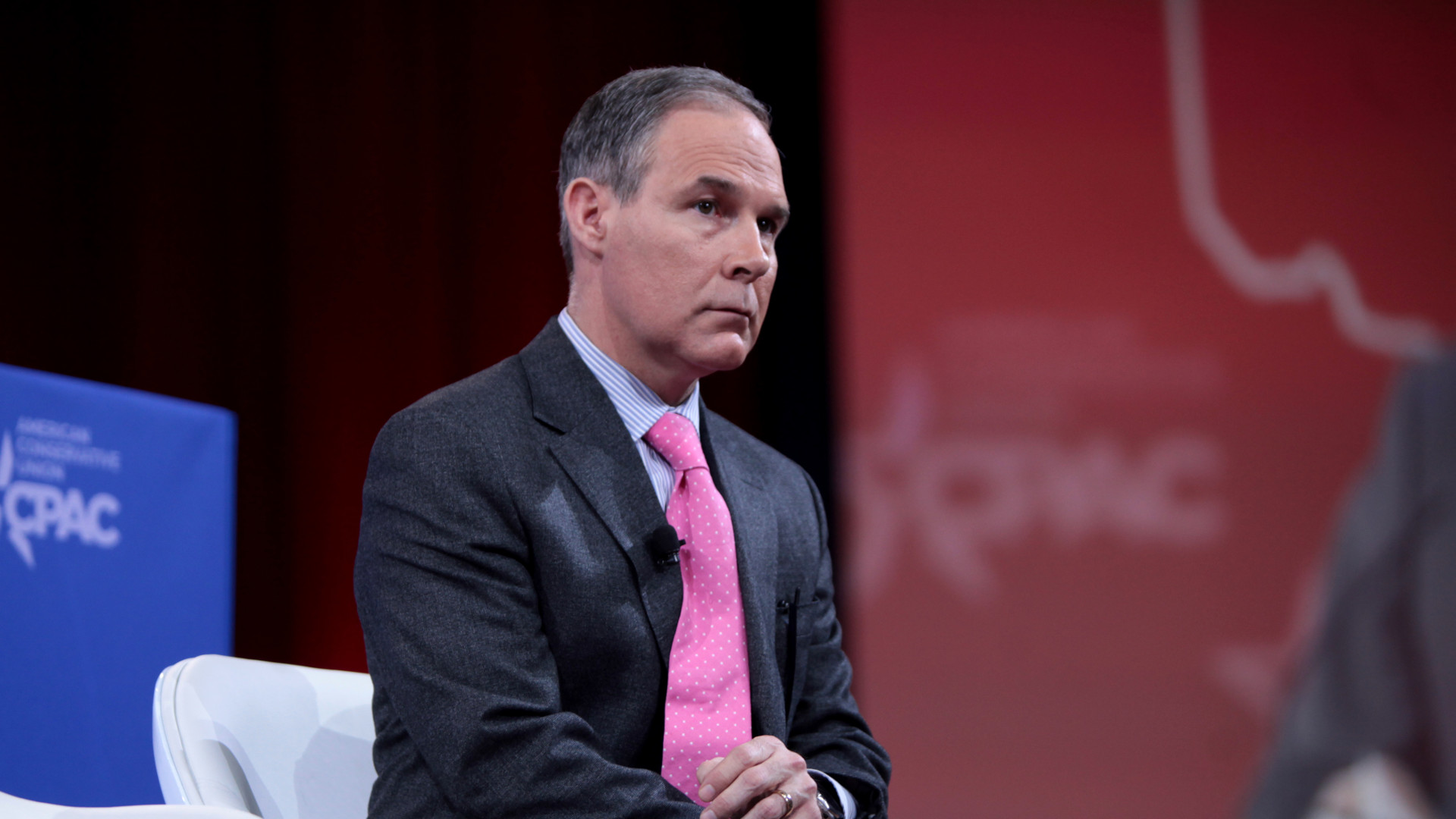Even his soundproof phone booth, tactical pants and 24/7 security teams weren’t enough to save him. EPA Administrator Scott Pruitt has resigned from office — or possibly been forced to resign — following months of ethics scandals related to his profligate personal spending, secret schedules, expensive travel and cozy relationships with industry.
The resignation was announced by President Trump in a tweet on July 5.
Pruitt’s full resignation letter was later published by Fox News. The letter praised President Trump and the “transformative work that is occurring” — and characterized the president’s election as “God’s providence.” Pruitt also claimed he was resigning because “the unrelenting attacks on me personally, my family, are unprecedented and have taken a sizable toll on all of us.”
Speaking of a toll taken on all of us, Pruitt’s tenure at the Environmental Protection Agency saw a seemingly never-ending list of actions designed to do anything but protect the environment. Pruitt-backed actions include removing climate change from official policies (and from EPA web pages), rolling back clean-air and clean-water regulations, extending the use of previously restricted toxic pesticides, and hiring oil-industry insiders to key positions.
Reactions to his resignation were quick and brutal.
“Good bye Scott Pruitt, the worst Administrator in EPA history and perhaps the word cabinet member ever,” tweeted former White House chief ethics counsel Richard W. Painter. “Fake science, fake ethics and fake religion (complete with a cultish theology of planet destruction) all rolled into one. Good bye.”
“While he clearly violated ethical standards and bilked taxpayers, he inflicted far worse injury on American children and families by abandoning science and the EPA’s public health and environmental mission,” said Ken Kimmell, president of the Union of Concerned Scientists.
“Scott Pruitt’s corruption and coziness with industry lobbyists finally caught up with him,” said Erich Pica, president of Friends of the Earth. “We’re happy that Pruitt can no longer deceive Americans or destroy our environment. This victory belongs to the hundreds of thousands of activists who fought to protect the Environmental Protection Agency from a corrupt crony set on destroying it from the inside.”
Ironically, Pruitt’s own last tweet from his official EPA Administrator account read “Happy Independence Day, America!” (That tweet has since been deleted.)
What Next?
Pruitt’s departure leaves a leadership vacuum — well, even more of one — at the EPA. The most likely potential nominee to replace him — and the man Trump has already announced will take over as acting administrator — is former coal lobbyist and climate-change denier Andrew Wheeler, who was confirmed as deputy EPA administrator on April 12 despite fairly vague and ineffective Democratic opposition. Wheeler’s name was bandied about earlier this year when it looked as though Pruitt was gunning for U.S. Attorney General Jeff Sessions’ job. He is perceived as a Washington insider who “has spent years effectively navigating the rules,” according to The New York Times. In the long run, this may make Wheeler a much worse threat to the environment than Pruitt.
If Wheeler doesn’t make the cut to permanently take the position as the new EPA administrator, other potential Pruitt replacements include former industry lobbyist Susan Bodine, just one of a host of people who — like Pruitt himself — made names for themselves by suing the EPA before being brought on board the agency.
What will Pruitt’s legacy be? Well, it probably won’t be good. “Sadly, the ideological fervor with which Pruitt pursued the destruction of environmental regulations and the agency itself live on in the Trump administration,” said Ken Cook, president of the Environmental Working Group.
Others echoed that sentiment. “Pruitt was able to hang on as long as he did, amid all the mini-scandals, because Trump loved how he was working to dismantle EPA,” said Michael Gerrard, president of the Sabin Center for Climate Change Law. “That won’t be lost on Wheeler, who will continue the wrecking, presumably without the distractions.”
Some expressed hope Pruitt will just be the first to go. Kendall, with the Union of Concerned Scientists, said it’s “time for the EPA to clean house,” much as President Reagan did in 1983 after a set of ethics violations hit his agency. “The next EPA administrator needs to be someone who will uphold independent science and commit wholeheartedly to the agency’s science-based mission of protecting public health and the environment. Until then, Congress should conduct considerably more oversight because political appointees at the EPA are sidelining science and compromising the agency’s effectiveness.”
Meanwhile, experts say many of Pruitt’s environmental rollbacks may not last. As The New York Times pointed out a few months back, many of the deregulatory actions Pruitt has taken over the past year were handled so quickly and carelessly that they may not pass legal muster (and, indeed, have already failed in some cases).
But the damage to the EPA itself will take some time to heal. As Mother Jones writer Rebecca Leber wrote in April, “you can’t talk about Pruitt’s lasting damage without talking about how he’s attacking science and expertise, pursuing buyouts and restructuring offices, and his pulling back on state work.” And the people Pruitt brought into the EPA — many of whom share his conflicts of interest — seem likely continue his industry-friendly policies.
And what happens to Pruitt himself? Prior to his resignation, at least 18 federal investigations were looking into his reported ethical lapses. Whether or not he will be prosecuted for any of those problems — or if his wife will finally get that coveted Chick-fil-A franchise — remains to be seen.


